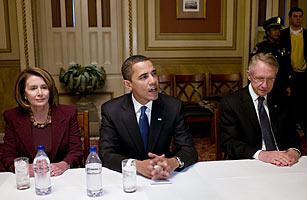
This is the big one, the ambitious initiative on which President Obama bet his first term. And he almost got it done in the first year, getting two similar bills passed along party-line votes in the House and Senate. But he did not pass the finish line, and the cost in political capital has been substantial. An early January poll by NBC News and the Wall Street Journal found that just 38% of the country approved of how Obama has handled health care reform, compared with 55% who disapproved. Now, with the loss of Ted Kennedy's Senate seat in Massachusetts to Republican Scott Brown, Obama must go back to the drawing board, reworking a coalition that could continue to erode as the 2010 election approaches.
Even if he does manage to sign a bill this year, it remains unclear just how well the compromise Obama has fashioned would fulfill his goals. Deficit hawks have complained that the proposals would do little to bend the long-term cost curve. Liberals have worried that the health-insurance mandate would cause a financial burden on middle-income citizens who don't qualify for government subsidies. And several business groups have complained that new taxes on insurance, drug and medical-device makers would lead to increased costs for insurers.